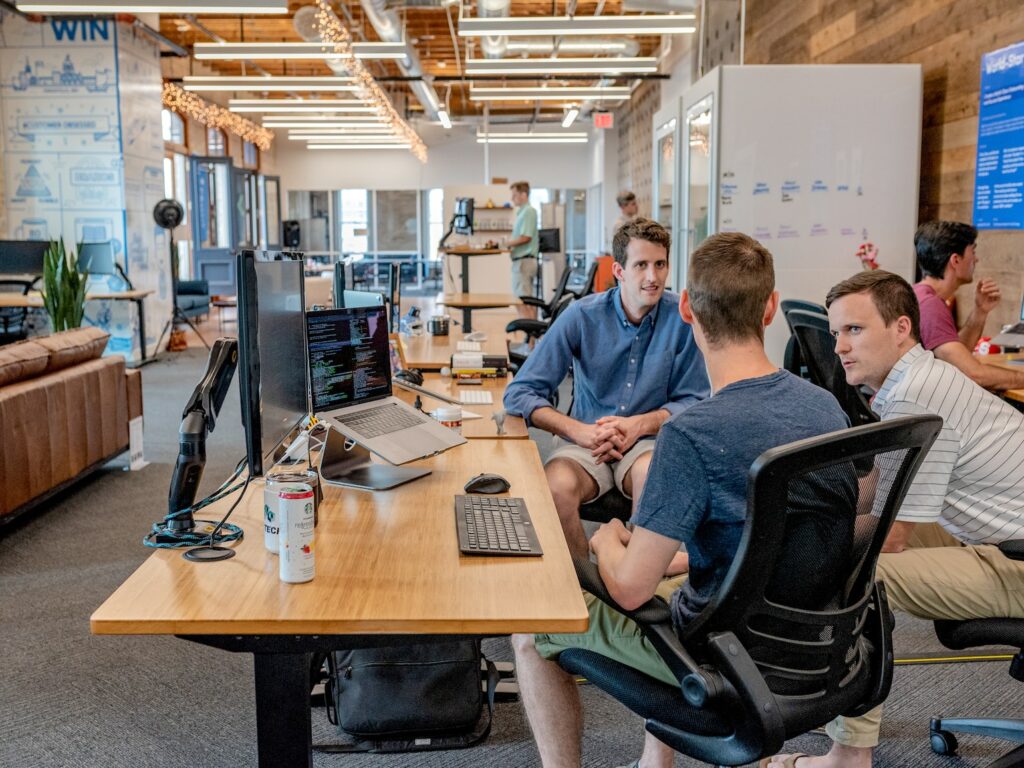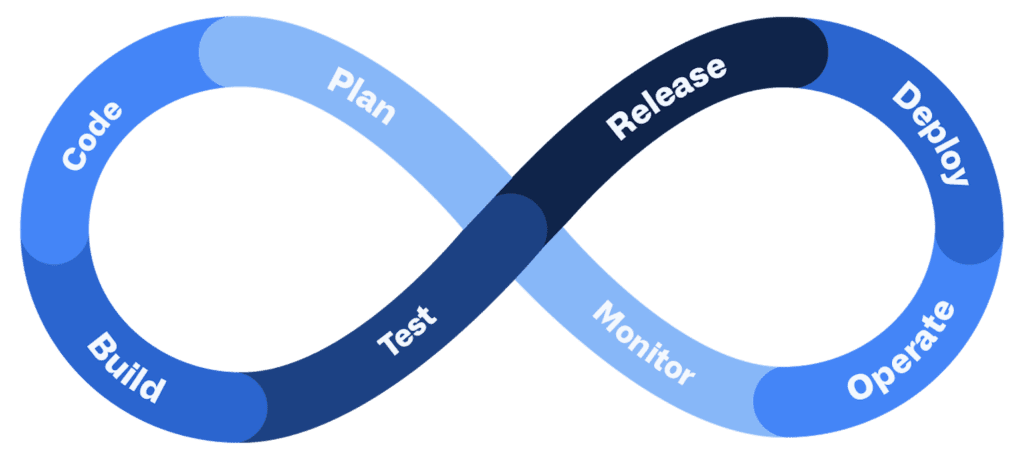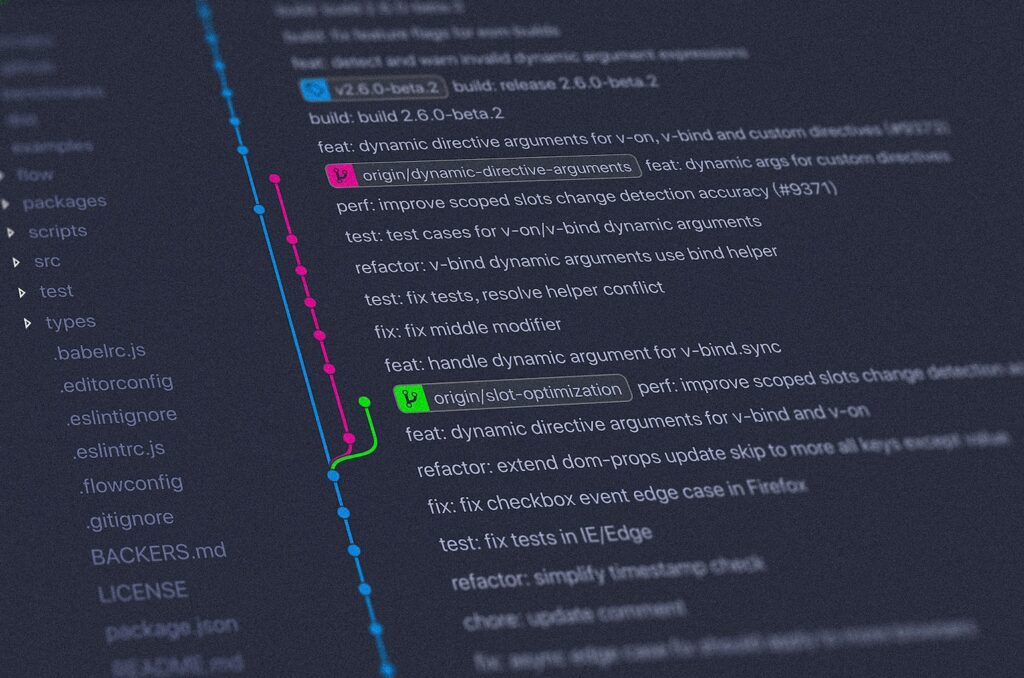What is a DevOps engineer and what do they actually do? DevOps engineer jobs are hugely in demand. It’s a role that helps development and IT operations teams work together better to release code more quickly, efficiently, and reliably.
DevOps methodology is a fairly new concept (it became popular in the 2010s) and the DevOps jobs market is still growing quickly.
In this post, I’ll give an introduction to the role of a DevOps engineer — what DevOps means, what the job involves, the average DevOps engineer salary, what skills you need to know, how to become a DevOps engineer, etc.
Table of Contents
- What Is DevOps?
- What Is a DevOps Engineer?
- Why Become a DevOps Engineer?
- 7 DevOps Skills You Need to Know
- How to Become a DevOps Engineer
- FAQs
- Is DevOps Right for You?
Disclosure: I’m a proud affiliate for some of the resources mentioned in this article. If you buy a product through my links on this page, I may get a small commission for referring you. Thanks!
What Is DevOps?
DevOps is a mashup of “development + operations” — and as the name implies, DevOps methodology bridges the gap between software development and IT operations.
The goal of DevOps is to help create a strong collaboration between the two in order to release high quality code quicker, recover from failures quicker, and keep production failures to a minimum.

DevOps vs Agile
You may have heard the term “Agile” and wondered about DevOps vs Agile. The two are actually intimately connected: Agile is the DevOps methodology typically used by DevOps engineers. It’s a framework for developing and releasing code that is cyclic, iterative, and collaborative.
The opposite of Agile (and a method not used by DevOps teams) is called Waterfall. Waterfall is a sequential methodology, meaning everything is done in order, and requirements for the project are fully defined before the project ever gets kicked off.
With the Agile DevOps methodology, a project is divided into smaller chunks called “sprints.” Each sprint has a specific duration, and individual tasks within that sprint need to be completed during the allotted time (usually a week or a few weeks).
CI/CD in DevOps
Another important concept in DevOps is Continuous Integration and Continuous Delivery (CI/CD). This involves working on various stages of a project concurrently, instead of linearly like in the waterfall method. This allows teams to deploy code several times per day, instead of waiting to deploy it all at once.
As you can see, the main goal of DevOps is to enable developers to deploy code quickly and often, adapting as needed and taking into account feedback from customers and users.

☝️ Back to the table of contents
Start coding now
Stop waiting and start learning! Get my 10 tips on teaching yourself how to code.
What Is a DevOps Engineer?
So now that you know what DevOps actually is, what are DevOps engineers? And what does a DevOps engineer do?
💻 DevOps engineers, AKA development operations engineers, help software teams deliver high-quality software and keep services running reliably and efficiently.
They work with software engineers, system operators (SysOps), technicians, admins, and other people involved in software production.
The role of a DevOps engineer is to help make the software development life cycle run as quickly and smoothly as possible without sacrificing quality. This includes duties like coding, deployment, maintenance, and updates.
The main responsibilities in a DevOps job description typically include things like:
- Automating repetitive tasks to reduce hours spent on development projects
- Optimizing code release cycles with new practices and procedures
- Troubleshooting and resolving issues in dev, testing, and production environments
- Creating, maintaining, and iterating on CI/CD processes
- Managing IT projects (making sure people know objectives, being aware of deadlines, etc.)
- Testing how well systems are running
- Managing Linux virtual environments
- Identifying bottlenecks throughout system infrastructure
Everything a DevOps engineer does is guided by DevOps principles like continuous improvement, experimentation and learning, etc.
☝️ Back to the table of contents
Why Become a DevOps Engineer?
First of all, It’s a lucrative career! 💰 The average DevOps salary clocks in at $118,086 per year. Junior DevOps engineers (entry-level) can earn $73,829/year right off the bat.

Another reason is that you’ll enjoy job security in an in-demand career that’s still growing 📈:
- According to The Upskilling 2020: Enterprise DevOps Skills Report released by DevOps Institute, DevOps engineers were the most in-demand job title in 2020.
- According to the same study, 58% of respondents said that finding skilled individuals is a huge challenge and 48% say the retention of skilled DevOps individuals is a challenge.
- In the US, there were over 300,000 job openings requesting DevOps skills in the past 12 months
- According to GitLab’s April 2021 Upskilling Enterprise DevOps Skills Report, DevOps skills are projected to grow 122% over the next five years
Nearly every company in any industry can benefit from DevOps engineers, meaning you have the ability to choose the industry that interests you most.
The lifestyle perks are one more draw of DevOps engineer jobs. DevOps specialists report high levels of happiness. The majority of DevOps specialists (88.2%, to be precise) aren’t actively looking for a job, implying that most are satisfied in their current roles. Furthermore, many DevOps roles can be done remotely, which is great if location flexibility matters to you.
☝️ Back to the table of contents
7 DevOps Skills You Need to Know
Let’s dive into seven important DevOps skills and how to learn them!
1. Cloud computing environments (AWS, Azure, GCP)
DevOps engineers need to know at least one cloud computing platform. The most popular are Amazon Web Services (AWS), Microsoft Azure, Rackspace, Google Cloud Platform (GCP), or Oracle Cloud.
These cloud platforms have services that allow DevOps engineers to complete many necessary tasks (e.g., managing infrastructure, deploying application code, automating software release processes, monitoring infrastructure performance).
➡️ How to learn it:
- Introduction to Cloud Computing on Amazon AWS for Beginners on Udemy
- There are also AWS certifications you can prepare for and take to prove your skills to employers. Amazon’s AWS DevOps Engineering Learning Plan can help you prepare you for the AWS Certified DevOps Engineer – Professional certification exam
- You can also check out my top recommendations for the best AWS courses for beginners!
2. Continuous Integration and Delivery (CI/CD) concepts
The CI/CD DevOps principles allow you to frequently deliver apps to customers with automation and continuous monitoring. It essentially means that new code changes are regularly built, tested, and merged to a shared repository, not saved up until everything is completed and deployed all at once.
CI/CD tools you’ll need to know may include GitHub Actions, Travis CI, Jenkins, TeamCity, or CircleCI, depending on what the company uses.
➡️ How to learn it:
- The CI/CD Process free course on Coursera
- Continuous Integration and Continuous Delivery: The Big Picture on Pluralsight
3. Scripting language(s)
Many DevOps roles require scripting experience in Bash, Python, Perl, or PowerShell. Scripting skills in DevOps jobs are needed in order to navigate through devices, software, and servers, and for automating various programming tasks.

➡️ How to learn it: Scripting Essentials for DevOps on Udemy
4. Configuration management
As a DevOps engineer, you’ll need experience with configuration management platforms such as Ansible, Puppet, or Chef. Configuration management is a process for maintaining computer systems, servers, and software in a desired state. It helps identify any systems that need to be patched, updated, or reconfigured to conform to that desired state.
➡️ How to learn it: Configuration Management and the Cloud on Coursera
5. Container technologies
DevOps engineers also need to be familiar with containerization technologies like Docker, Kubernetes, Kafka. These are tools used to create, deploy, and run applications using containers (i.e., complete packages of software that include everything needed to run an application).
➡️ How to learn it: Introduction to Containers, Kubernetes and OpenShift on edX
6. Git & Git repositories
Git is a version control system that allows programmers to work more collaboratively. It’s a core component of DevOps. You may also need to be familiar with GitLab, GitHub, or Bitbucket, which are web-based Git repositories.

➡️ How to learn it: Version Control with Git on Coursera
7. Linux fundamentals
While DevOps engineers often work on a mix of operating systems (Windows, Mac, Linux), Linux is the most used OS in the servers world. Not only that, but most dev infrastructure tools lean towards Linux tools. This means a majority of employers will probably require Linux skills in their DevOps engineer job descriptions.
➡️ How to learn it: Linux Fundamentals on Pluralsight
Bonus: Soft skills
Soft skills you’ll need as a DevOps engineer include:
- Curiosity
- Willingness to learn
- Communication
- Teamwork
Since a DevOps engineer works so closely with other members of the software team, the most key soft skills are about being able to collaborate well with others!
Here are some places to learn DevOps skills (and more) for free!
☝️ Back to the table of contents
Start coding now
Stop waiting and start learning! Get my 10 tips on teaching yourself how to code.
How to Become a DevOps Engineer
When you’re looking into how to become a DevOps engineer, there are a few different avenues to explore. (A combination of the options below is usually best!)
🖥️ 1. Take courses or bootcamps
There are plenty of options here too. For instance, you can take several of the courses mentioned in the sections above to build up your individual DevOps skills (kind of like building your own DevOps degree).
Or, you can take a more comprehensive DevOps course/bootcamp that will teach you all the skills you need to know to become a DevOps engineer in a single comprehensive program. Here are a few to check out:
- DevOps Bootcamp: Learn Linux & Become a Linux Sysadmin on ZeroToMastery
- Become a Cloud DevOps Engineer on Udacity
- DevOps Bootcamp by The Linux Foundation
- 30 Days Devops Challenge by School of Devops
👩💻 2. Build your own projects
No matter how you choose to learn DevOps skills, building your own projects is a great way to practice them and reinforce what you’ve learned. Automate some routine tasks, develop a web app and deploy it on your personal AWS, create and run a CI/CD pipeline for an app, build a monitoring dashboard for an app, etc.

This also gives you something to show to employers when you’re ready to apply for jobs (e.g., as a git repo link on your resume).
📃 3. Get certified
As you train, you can make it a goal to get a certification. There are numerous DevOps certifications you can study/prepare for and then take to prove your skills to potential employers. For example:
- Docker Certified Associate (DCA)
- Certified Kubernetes Administrator (CKA)
- Red Hat Certified Specialist in Ansible Automation
- AWS Certified DevOps Engineer – Professional
- Microsoft Certified: DevOps Engineer Expert
👔 4. Work your way in
Another option is to start out with other jobs in tech and build your way up, like these two guests from the Learn to Code With Me Podcast did:
- Logan Tran started in quality assurance, got a job as a junior software engineer 2 years later, and then became a DevOps engineer
- Before becoming a DevOps engineer, Nicole Forsgren was a professor, a performance engineer, and a sysadmin.
Since DevOps is a hybrid field, you can get into it from either the “dev” side or the “ops” side. For example, you can start as a developer (Dev) or in product management (Ops) before gaining the other side of the skills you need to move into DevOps.
☝️ Back to the table of contents
FAQs About DevOps Engineers
Let’s answer a couple of questions about how to become a DevOps engineer!
Is DevOps easy to learn?
DevOps is a multidisciplinary field, meaning you’ll have to understand the dev and the ops side. That means it’s not the easiest career to break into.
However, learning the fundamentals and DevOps concepts/methodologies isn’t too challenging with a bit of effort, especially if you take it one step at a time. Working on your own projects, studying for certifications, and taking online courses or a bootcamp-style course can all make DevOps easier to learn.
How long does it take to become a DevOps engineer?
Since DevOps requires an understanding of the bigger picture, you’ll often need real-world experience before you can get hired on as a DevOps engineer. That may mean time spent in other roles (e.g., developer, sysadmin), help from a mentor, internship experience, etc.
Learning from online courses can definitely give you a solid foundation, but it may be a few years before you can become a full-time DevOps engineer. And that’s okay — you have to start somewhere! Logan Tran, for example, worked as a software engineer for over 1 year before getting a DevOps job. That’s not taking into account the time it took him to study to become a software engineer.
What related/similar jobs are there?
Think you might want to work in the DevOps ecosystem, even if it’s not precisely as a DevOps engineer? Some adjacent and overlapping titles include Site Reliability Engineer (SRE), Build Engineer, Release Manager, Platform Engineer, and DevOps Evangelist.
Which companies need DevOps engineers?
Nearly three quarters of organizations (74%) in a recent survey say they have now adopted DevOps in some form, and this figure only continues to grow! That means companies of all shapes and sizes are needing people with DevOps skills.
☝️ Back to the table of contents
Is DevOps Right for You?
DevOps is a unique field to get into because it blends both the dev and ops sides together. If you’re a fan of maximizing productivity and getting code out there, fast, this could be the role for you.
Not only is it a lucrative, in-demand role, but you’ll actually get to see the fruits of your labor on a nearly daily basis due to the continuous nature of DevOps coding and implementation.
🌟 But as always, the best tech career for you depends on your skills and what you’re drawn to. Keep browsing the Careers section on Learn to Code With Me for more career snapshots and advice on getting into various tech jobs!

